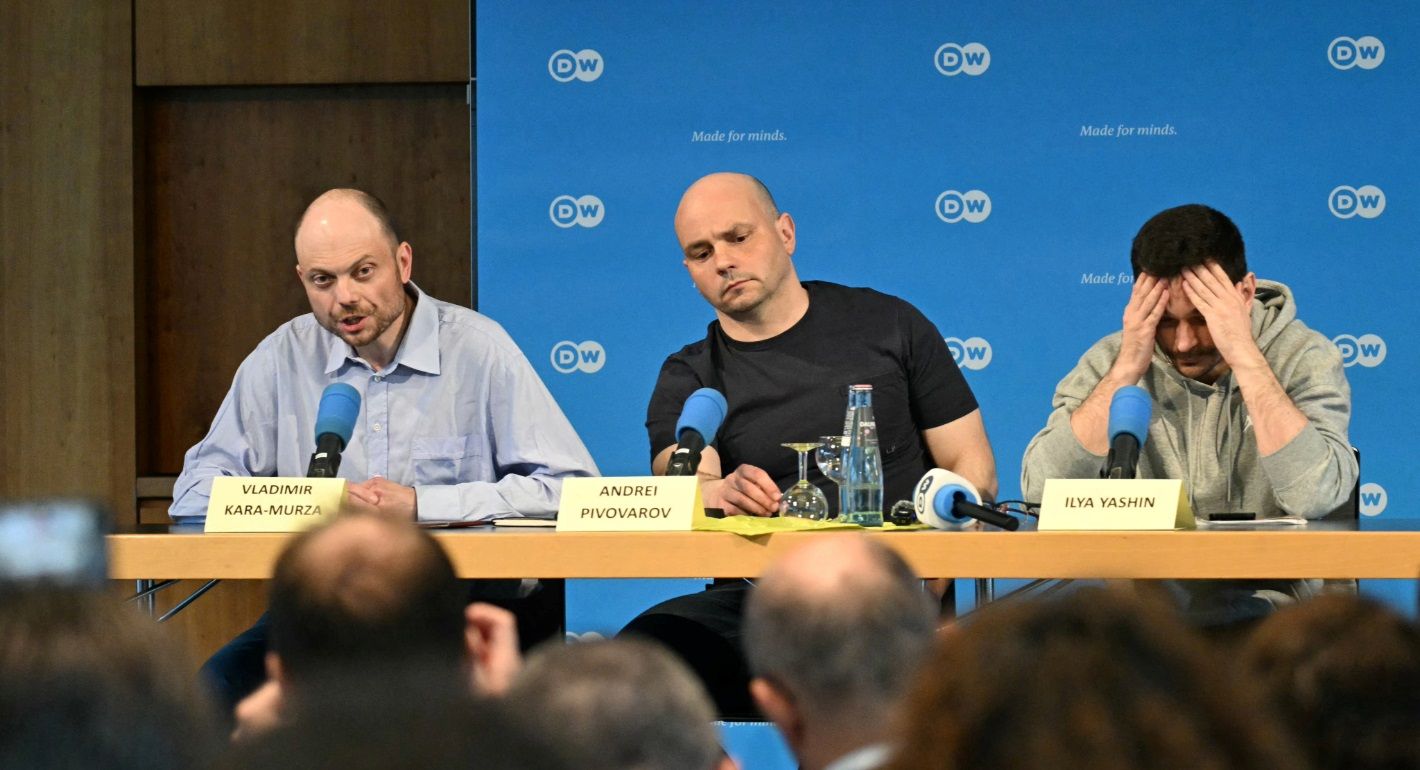In the West, comparisons with the Cold War—such as “the largest prisoner exchange between Russia and the West since the Cold War”—may have overwhelmingly negative connotations, but for Moscow, they are downright flattering. For those in the Kremlin, the Cold War was the height of the Soviet Union’s geopolitical power and global might, back when it was one of the poles in a bipolar world. From this perspective, anything reminiscent of the Cold War is not a loss of the achievements of détente, but a return to former glory.
For this reason, the prisoner exchange was deliberately orchestrated in the dramatic spirit of the Cold War: a spy thriller just waiting to be adapted for the screen. There was complete secrecy right up until the last moment, with prisoners mysteriously disappearing from penal colonies, and relatives and lawyers kept in anxious ignorance.
Another Cold War element is that while on one side of the exchange were genuine Russian agents, on the other were journalists, opposition activists, dissidents, and even an artist. Back during the Cold War, the Soviet regime regularly exchanged its intelligence agents for its own political prisoners. While from the outside this quite rightly looks like a degradation of the Russian legal system, it enables the regime to argue that the so-called dissidents and prisoners of conscience have finally been exposed as what they really are: agents of the hostile West, since Western countries agree to accept them as payment for Russian agents.
Such a large exchange—bigger than Soviet-era exchanges—raises the question of whether it is an isolated event or a prologue to something bigger. In Soviet times, political prisoners were regularly exchanged for captured agents. For the Kremlin, it’s a useful and even prestigious practice. Under current legislation, the supply of political prisoners can easily be replenished, while espionage activities are always intensified during conflicts, so there will be no shortage of subjects for ransom.
But a more important question arises: Does the exchange clear the way for a long-awaited ceasefire, peace talks, and an end to the war in Ukraine? After all, even Ukrainian President Volodymyr Zelensky is now talking about the possibility of talking to the current Russian leadership, despite a formal ban on doing so enacted in 2022. Yet while a prisoner exchange would be a logical step preceding broader contact between Russia and the West, it does not in any way imply an intensification of contact or a détente in relations. From the viewpoint of the Russian regime, Russia is waging a war not against Ukraine, but against the West on Ukrainian territory. During a conflict, convicted opponents of the regime are akin to prisoners of war, and an exchange of prisoners of war may be an isolated operation that does not necessarily herald a move toward peace.
The Russian regime values any interaction with the West, since it can be held up as evidence of the oft-repeated thesis that Russia cannot be isolated, and that not only the “global majority” but even the West itself will inevitably return to pragmatic practical interaction.
Interaction without détente—such as an exchange in the spirit of the Cold War—is especially valuable to the Russian regime, for which détente is perceived as weakness, a surrendering of positions. Cold War–style contact, meanwhile, only testifies to the international strength of the regime, especially given the mafia state nature of the interaction: taking hostages and exchanging them for convicted prisoners.
For Russian President Vladimir Putin, there’s another plus. Securing the release of security service operatives imprisoned abroad—including those doing dirty work, like the exchanged assassin Vadim Krasikov—cements his personal relationship with the security services. Not that there were any cracks in that relationship: the security services corporation has always considered the former KGB officer one of their own. But given the regime’s reliance on repression to maintain control since the full-scale invasion of Ukraine, it is now more dependent than ever on the security agencies and secret services.
For all that, Putin has ultimately received exposed agents who can hardly be used for their intended purpose now. His opponents have gotten something potentially far more valuable: several tireless Russian opposition politicians who have built up their personal symbolic resources during their time in prison.
That could be a priceless acquisition for the exiled part of the Russian opposition, which at home has faced criticism—primarily from Russians adapting to the new levels of repression—for being insufficiently serious. It’s hard to level that accusation at anyone who was sentenced to a Stalinist jail term before miraculously being released from prison. In addition, judging by the very first press conference given by the released dissidents, they are set to take on an active role in the ranks of the opposition in exile.
It’s highly unlikely that the timing of the exchange is linked to any desire to help the U.S. Democratic Party, which Putin hates. Rather, there are simply too many unknowns ahead. An operation involving the actions of several agencies from multiple countries, as well as individuals, had been prepared and coordinated. Between a result in hand and a hypothetical opportunity to use it in the future as either an incentive or punishment, the departmental logic of a ready project prevailed.
In a sense, therefore, the exchange is not just the end of the story about the release of certain people, but also the beginning of a story about an injection of fresh blood into the Russian opposition abroad, and its relationship both with independent Russians inside the country, and with the outside world.




